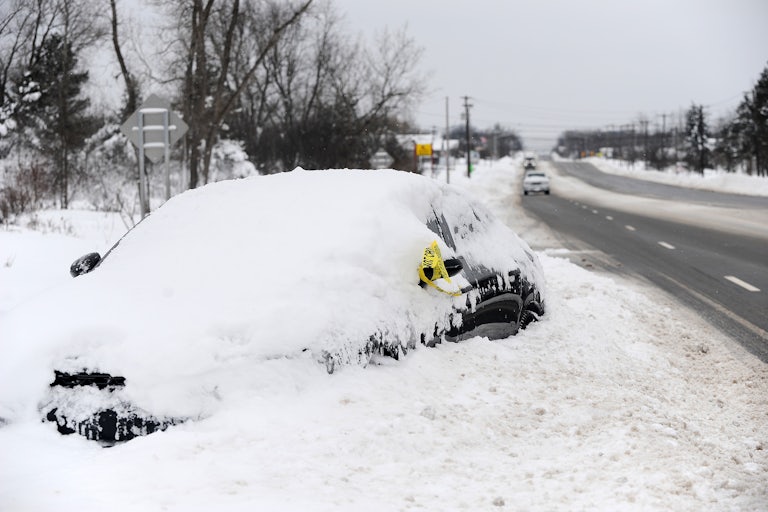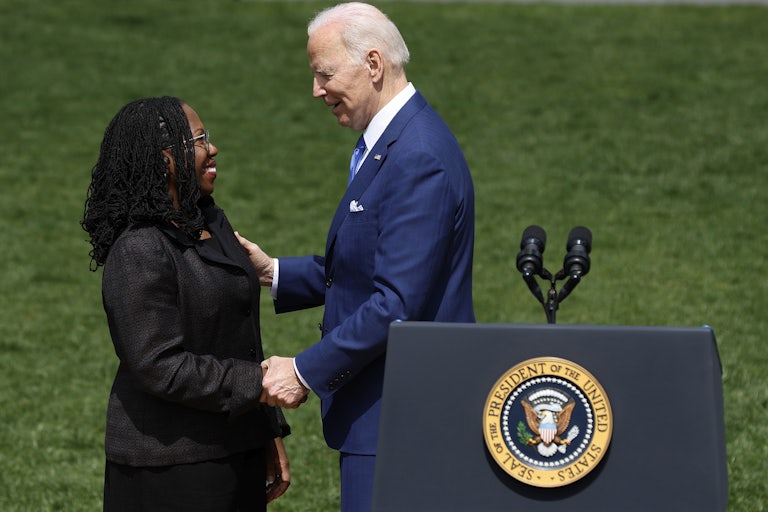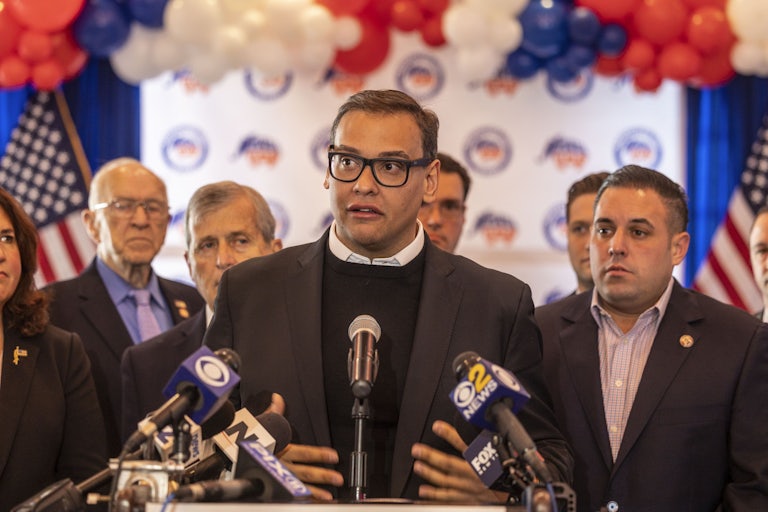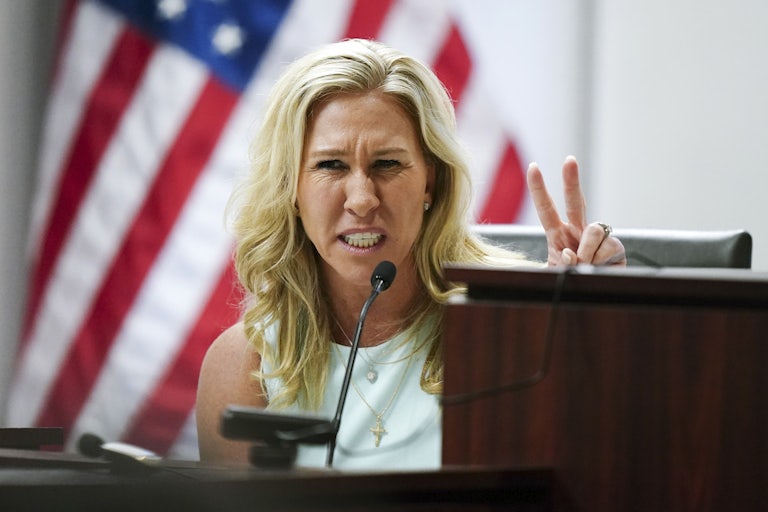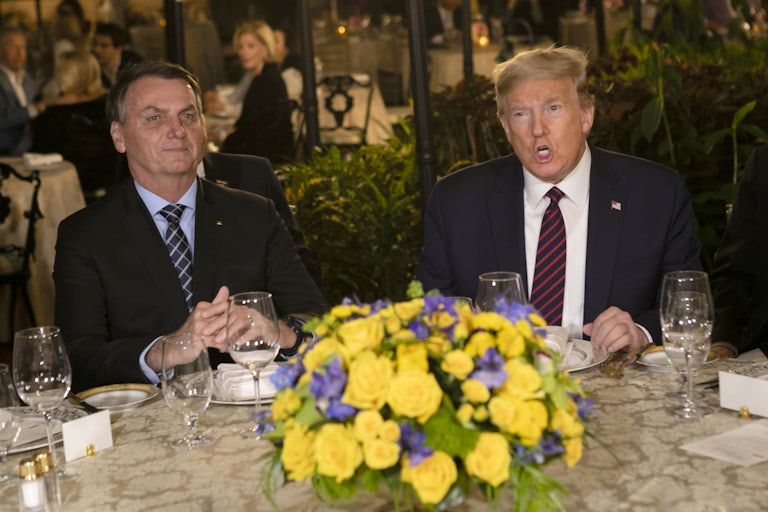“The Worst Time of My Life”: A Buffalo Blizzard Hero Speaks Out
A Q&A with Shaquille Jones, the New Yorker who pitched in to save lives as a destructive winter storm ripped through his community.
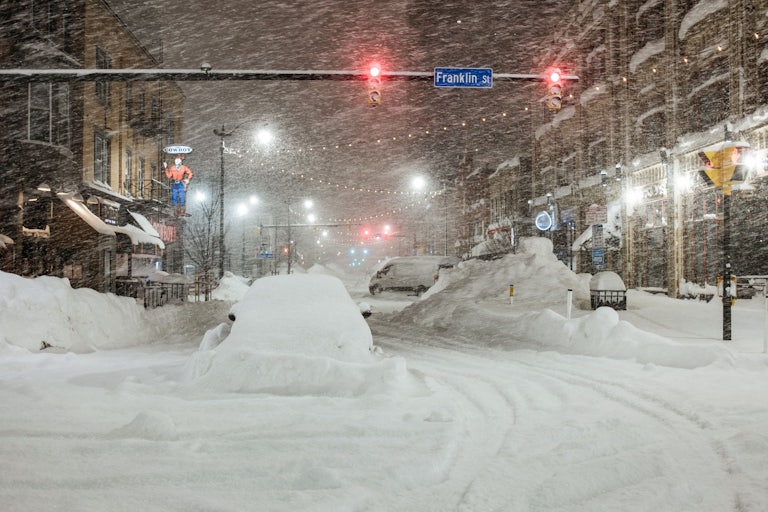
As a calamitous blizzard devastated upstate New York, leaving at least 39 dead and thousands without power, government agencies fell short, leaving citizens to largely fend for themselves and each other. One of these citizens was Shaquille Jones: Days after being stuck in the snow himself for 18 hours—on the cusp of fatal frostbite—he chose to do his part helping others in his community by delivering supplies, serving as an ersatz taxi driver, and wielding his jumper cables on the behalf of hundreds of his neighbors. He even helped save a snowed-in couple and their 1-year-old baby, who was in dire need of a ventilator. At one point during his rounds, someone with authority finally arrived on the scene—to tow away the truck he had borrowed for his mission. (Jones was forced to pay out of pocket to get it back).
I was able to reach Jones by phone on Friday morning; he took me through what he saw as he operated in what amounted to a winter-weather war zone—scattered bodies, abandoned and snowed-in vehicles, and little institutional help to find anywhere.
This interview was edited for length and clarity.
Take us through your past week.
My mom, sister, and two nieces were getting food for the storm, and they got stuck. I borrowed a buddy’s truck to come down and get them, and then we got stuck. I called the police maybe after two hours. They said they were sending someone to help us. At this time, the snow was—you couldn’t be out there; it was ridiculous, you couldn’t see anything, you couldn’t do anything. So we sat there for about another two hours. So we’re four hours in, and I called again; they’re like, “We’re sending someone, we’re sending someone,” and nobody came. So, seven hours rolls around: “We’re sending someone”; 10 hours roll around: “We’re sending someone”; 15 hours roll around: “We’re sending someone.”
Finally, here’s 18 hours. We’re still sitting there, and the snow is covering the doors, so we can’t get out and it was almost going to cover the windows. At this moment, we had to make a decision: We’re gonna either sit here and we’re gonna die in this car—because we’re freezing—or we’re gonna get out and try to run for it. We’re either going to sit there and die, or die trying to get to help. My sister has a broken leg, she was on crutches. My niece, for some reason, had no coat on. So at this moment, we get out of the car, it’s about four o’clock in the morning. The snow was still coming down, it was a whiteout; you can’t see anything. It was really bad. We had to get out the window, slide down the snow, and we walked for 20 minutes to the hospital in minus 20 degree weather with 80 mph wind.
The doctor said if we were out there at least one more minute, I would have died because my blood flow had stopped because it was so cold. We had frostbite, we had to get wrapped, it was horrible.
We stayed in that hospital for a day and a half, two days. I got a buddy to finally come pick me up, he got me home to my family on Christmas Day about maybe five or six in the morning. After my kids were done opening their gifts, I decided to go back out. I haven’t seen them for days after that. I’ve been out rescuing people that needed to be rushed to the hospital because the police said they are not coming.
So I’ve rescued hundreds of people, saving them, getting them to help, seeing people 50 years old, 90 years old in the house for hours with no heat, frostbitten; a baby that I saved was on a ventilator that had no electricity; they were hand-pumping their baby to have them breathe. That was by far the worst thing I’ve ever had to do in my life: pump a baby while walking through snow to try to get them to some type of electricity. We opened up a building for heat and food and baby clothing. I have not taken money from anyone. I done it all for free. They were asking me if I could put up my cash app for donations for food, so I did do that and [went] to the supermarket and got a bunch of food, diapers, you know, any supplies that can help out. We have been delivering ever since.
I went back up to the truck that I borrowed. And they just took it, right before I pulled up. I had to pay $350 to get the truck back. The truck was damaged, I have to pay for out of pocket. It was the worst week of my life.
Wow. And that tow fee—here you are, trying to help the community, and you come back to that.
Yeah, the thing about that is I don’t believe that they care. The way New York State went about even ticketing people with the driving ban and stuff like that is beyond me. How could you do this to people after a natural disaster? Why would you? I understand you have to get paid, I understand you’re running a company. But come on, I mean 300-some odd dollars. That’s insane.
I understand others began to help you as well, right? Who were they, and how did they get involved? What have you been doing together?
Well, first of all, one of them was a stranger I’ve never met in my life. He came down to Buffalo inside the storm the same day I got stuck and got into the hospital, he came down to try and rescue me. And this is a guy that I have never met in my entire life. He heard that I was stuck, and he said, “Man, I’m going to get this guy no matter what.” This guy didn’t have a dime in his pocket, and I didn’t know this. If he would have told me this, I would have told him not to come, but this guy made an effort when nobody else made an effort. I’m just so grateful for him. His name is Tayron Knight from Niagara Falls. He’s been with me ever since. A guy whose nickname is JC, that’s my wife’s cousin. A Buffalo Police officer that came out after we got to the baby—he’s been going ever since. And it was about four or five of us. Pharoah Page from Buffalo, New York, who opened up his skating rink for heat, and groceries, and food for the people to come. So, it is good people that I had involved with me—thank God, because at first I was alone, I was by myself, but when we rescued that baby and people saw that, they started wanting to get more involved.
So you’ve been delivering and purchasing supplies, driving people around. What other things have you guys been doing?
Yep, so we’ve been purchasing supplies, getting people to hospitals, jumping cars. We still are out here; my phone is like a 911 hotline. And I hope people know that anytime that they call me, I will be there.
But we dealt with so much racism and [inaction]. My buddy went into the gas station, and he asked to use the bathroom, and the guy told him, “Not for your kind.” It really was a bad situation—he told me after we left, and that really hurt me to the core. I stopped, went to get a guy out of his house. It was a bigger guy. And the National Guard was standing there, like maybe a block up. I said, “Man, I really could use your guys’ help, please, you know help me get this guy out of his house and take him to the hospital, I can put him in the back of my truck to take him to the hospital.” This guy told me, “Unfortunately we’re not EMS.”
I said, “Well, you don’t have to be EMS. I just need a couple of hands please.” This guy told me unfortunately, he had to get his partner some lunch, so he won’t be able to assist. The government, man, I don’t know what’s going on with the New York state government, I feel as though they did leave us behind, they left a lot of people in trouble and stranded. I don’t understand, all this stuff should have been more prepared. It’s really a shame. And I’m really going through it—I’m having flashbacks and stuff, I’ve seen so many people dead in the snow, in their car, not alert. It was a mess. I’ve never seen nothing like this in my life.
Tell me more about that, the things that have been frustrating you.
It’s just trauma. Seeing people throwing up blood and you got to take them to the hospital; 70-year-old ladies sitting in their cars for hours because they don’t have any heat, and the police are not coming. You can’t call for help. Thousands and thousands and thousands of people without electricity. It was a nightmare. You couldn’t call anyone, so I made myself available for them to call. I didn’t know what I was getting myself into when I did that.
But I would do it all over again—no matter the trauma that I’ve seen … people laying dead in the snow and walking past their bodies, tapping on the window and they’re dead and locked inside the car. It was rough, so now I’m dealing with trying to mentally prepare myself to stay on the right track; you know, stay focused.
How do you think things could have gone better? Where did things go wrong?
I really think the government dropped the ball on getting people here fast enough for the storm. I understand because of the driving ban, but you have [hundreds of thousands] of people in Buffalo that needed food who couldn’t get to it right away. Just because people make mistakes doesn’t mean you don’t go rescue them. You know officers took an oath … all these people that get paid from tax dollars … there was no one. They say we are not coming. The firefighters were out helping—I’m not sure about the police. I really didn’t see any police out. It was just—they wasn’t prepared. And it left people dying.
You’ve mentioned different ways this has impacted your mental well-being—could you talk a bit more about that, if you’re comfortable?
Yeah, it’s just basically having flashbacks of what’s been going on this past week. It was like back-to-back-to-back-to-back issues with people not breathing, and babies, and it was just traumatizing. I can’t believe that I had to literally pump a baby—if I [had done] it the wrong way the baby could die. When I first started, [the mother] was like, “You have to pump it like this, on time, or you know the baby will cough and he will lose breath.” I messed up one time and it shattered me—I was so broken because I thought that this baby was not gonna make it.
I’m still having flashbacks from, you know, just seeing the bodies—and bodies are still popping up all over the news. Buffalo, New York, will never, ever, be the same.
Is there anything that has been giving you hope or enlivening you throughout all this chaos and sadness?
I just think about my kids. What if that was my babies—my kids would not have made it, would not have made it in that storm. I barely made it. I’m telling you, my legs were purple, my arms were purple, my hands were purple. It was like something that you see in a movie—when we got to the hospital, everything was frozen: my eyebrows, my hair was ice. I couldn’t barely talk. It was the worst time of my life. And I just—God kept me going. Once I got better, I said, you know what? There’s people out here going through what I just went through. These people need help: Go. My family wasn’t too happy about it. But once I did it, they were like, “Oh, OK, we understand.” There’s nothing else I would have done differently.

